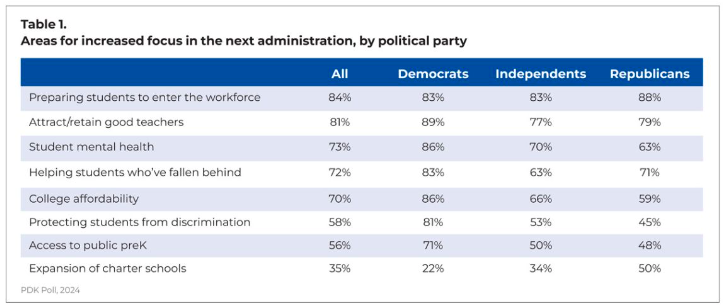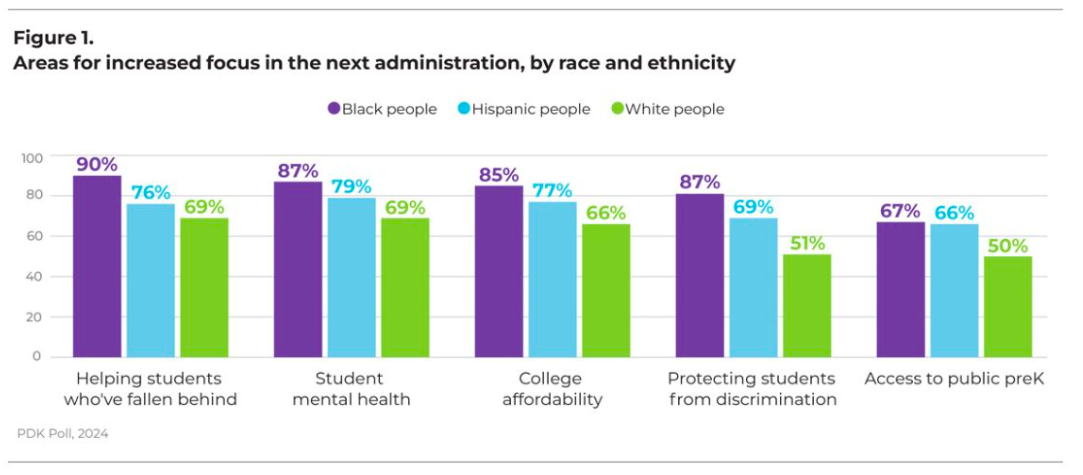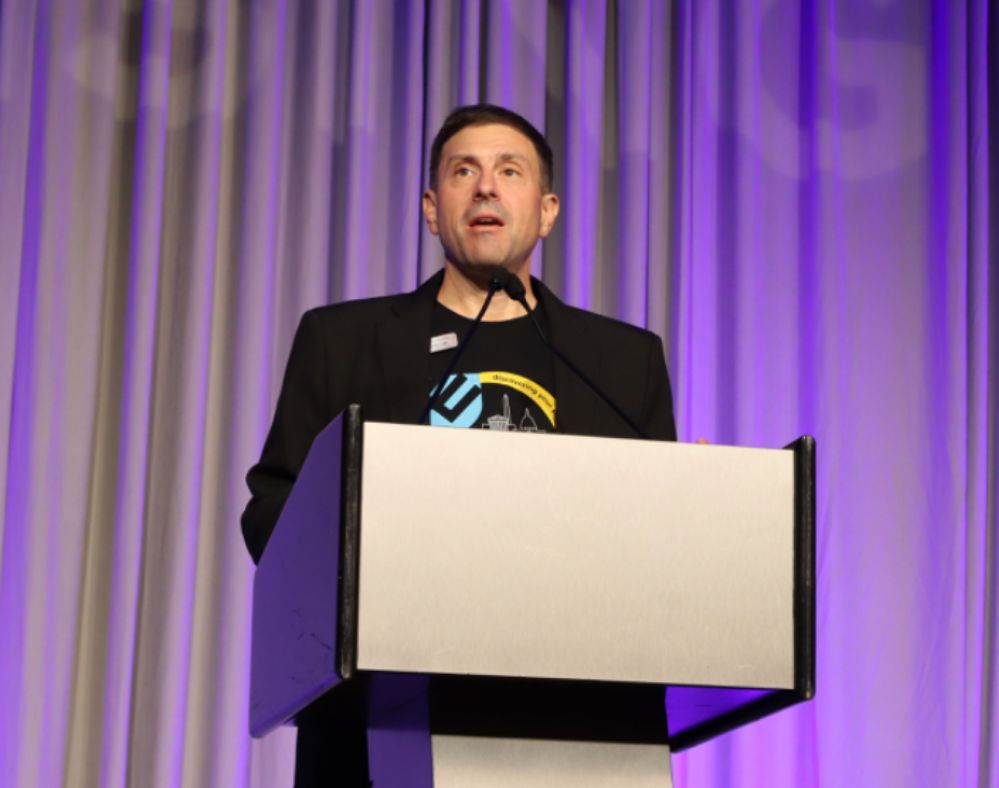Poll: Americans want next president to focus on workforce prep, hiring teachers
Linda Jacobson | August 26, 2024
Your donation will help us produce journalism like this. Please give today.

Meghan Gallagher/LA School Report
Heading into a divisive national election, a new poll shows that when it comes to education, at least, Americans overwhelmingly agree that the next president should focus on two things: preparing students for careers and attracting top teachers who will stay in the profession.
“There are clear priorities that overwhelming numbers of Americans on both sides of the aisle can support,” said James Lane, CEO of PDK International, a professional organization for educators that administers the annual survey. “If I were a candidate for any office at the federal level, I would want to know those things that have broad support because they’re likely to have an opportunity for success.”
But beyond those narrow avenues of agreement, the country is separated by large partisan differences on issues from student mental health to paying for college. Eighty-six percent of Democrats want the next administration to focus on mental health and college affordability, compared with less than two-thirds of Republicans.

American voters also vary widely on their views of Washington’s role in education. Former President Donald Trump says he would dismantle the U.S. Department of Education, push for universal private school choice and expect schools to promote patriotism, according to his education platform. On the Democratic side, Vice President Kamala Harris would push for more “stringent guardrails” on charter schools, revive an effort to pass universal pre-K and expand the child tax credit to provide up to $6,000 for families with a newborn.
Less than half of Americans — 45% — approve of how the Biden administration has handled education policy, the same approval rating they gave former President Donald Trump in 2020. But less than a third say they’d trust Trump on education if he’s elected again in November. Their views on a potential Harris-Walz administration are unclear — the poll was conducted before the disastrous debate that sparked President Joe Biden’s departure from the race.
Lane, who served as acting assistant secretary for elementary and secondary education at the U.S. Department of Education in the Biden administration before joining PDK last year, declined to comment on the president’s education track record. Attitudes toward the candidates might have shifted slightly if the poll had been conducted after Harris became the nominee, he said, but views on the major issues likely wouldn’t have changed much.
The large partisan gaps are surprising given that many issues “don’t really have a straightforward partisan connotation,” said David Houston, an education professor at George Mason University. Public pre-K, for example, has long held bipartisan support at the state level, but a federal role in expanding access is a much higher priority for Democrats than Republicans, 71% and 48% respectively.
The poll also shows that 54% of Americans overall — and 70% of public school parents — say education will play an extremely or very important role in the upcoming presidential election. But Houston is skeptical.
“I would be surprised if education was the top-of-mind issue that would be deciding those votes,” he said. That could change, he said, if the race is really close. “Anything that moves the vote count a fraction of a percent matters in a head-to-head race.”
Across the sample of over 1,000 participants, there are also striking differences in responses by race. Support for a greater focus on helping students catch up in school, addressing mental health and reducing college costs is roughly 20% higher among Blacks than whites.
The largest gap is on the issue of protecting students from discrimination, with 87% of Black respondents saying they want more attention paid to civil rights, compared to 51% of whites. Hispanic and Black Americans were nearly tied on wanting the next administration to strengthen access to public pre-K — 66% and 67% respectively — but just half of white respondents viewed it as a priority.

The Trump platform doesn’t mention early learning, but a controversial playbook for his potential second term, released by the conservative Heritage Foundation, would eliminate Head Start, the federally funded program for low-income families. While universal preschool for 3- and 4-year-olds remains a plank in the Democratic platform, Biden was not able to win Congressional support for the issue when he ran on it in 2020.
Views on charters
Charter school expansion was the only issue where less than half of Americans — 35% — want an expanded federal role. Surprisingly, just half of Republicans called it a priority, perhaps reflecting the party’s increasing shift toward education savings accounts, which allow parents to pay for private school tuition or homeschooling costs with public funds.
“[GOP] interest in charter schools has really petered out, compared to their heyday in the 2010s,” Houston said. “The school choice wing of the party has its energies focused elsewhere.”
Among Democrats, who often accuse such schools of siphoning students from traditional outlets, less than a quarter wanted more federal attention on charter expansion.
Enrollment trends tell a different story, said Sonia Park, executive director of the Diverse Charter Schools Coalition, a network that encourages socioeconomic and racial diversity. Charters overall have seen continued growth — a 2% increase last year, data shows — during a time when the student population in district schools was flat or declining.
“Parents want quality public school choice, regardless of where they are, and charters are part of that,” she said.
Democrats promise to pick up where the Biden administration left off on charter policy. According to the 2024 platform, additional federal funding for charter expansions or renewals would hinge on whether local districts determine they “systematically underserve the neediest students” — a change that goes beyond restrictions the Biden administration adopted in 2022.
‘Harrowing’ results on teaching
With Harris’s selection of Minnesota Gov. Tim Walz, a former high school teacher, as her running mate, education is likely to get frequent attention during the fall campaign. But Lane, with PDK, wants to hear specific plans to address ongoing disruptions in the teaching workforce. Relief funds that allowed districts to hire more staff will soon expire, a reality that already contributed to a wave of layoffs. Some districts are still starting the school year with vacancies, and another recent survey shows just 16% of teachers would recommend the profession to their friends.
For the first time, the survey also asked the public about AI in education, a subject that often generates mixed reactions. Over 60% of Americans support AI for tutoring, test preparation and lesson planning. But only 43% favored students relying on AI for help with homework.
In keeping with its focus on teaching, PDK International routinely includes a question in its poll that asks parents whether they’d support their children going into education. The organization runs Educators Rising, a nationwide program that aims to get middle and high school students interested in the profession.
 James Lane served as acting assistant secretary for elementary and secondary education at the U.S. Department of Education before taking over as CEO of PDK International (PDK International)
James Lane served as acting assistant secretary for elementary and secondary education at the U.S. Department of Education before taking over as CEO of PDK International (PDK International)Just four in 10 parents say they’d like to see one of their children become a teacher — a significant drop from the three-fourths of parents who favored that choice when the question was first asked in 1969. The primary reason: low pay.
”We’re going to have to address salaries,” Lane said. “The fact that 60% of folks wouldn’t even recommend a teaching career to their own children is harrowing, considering the needs that we have.”